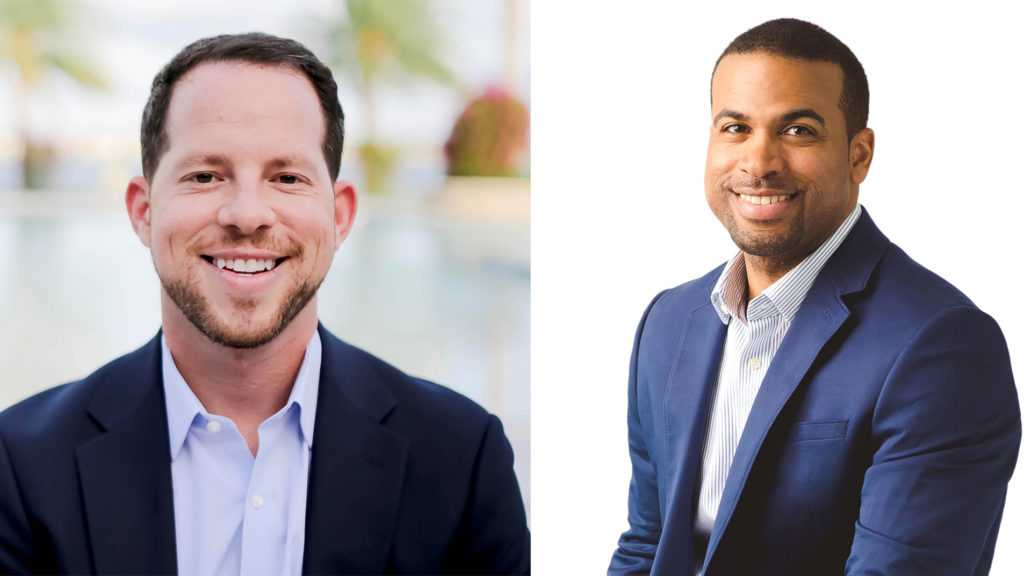
Jordan Isrow and Derek Olivier
By Jill Fox
After Rich Walker announced his run for mayor, leaving the District 2 seat open, Jordan Isrow and Derek Olivier threw their hats into the Parkland city commission ring.
Both are newcomers to politics. Isrow is a general counsel for Oxygen Development, an international cosmetics company headquartered in South Florida. He has raised $56,783 in corporate and personal donations.
and Olivier is the owner of One Market Real Estate in Coral Springs, with 23 agents servicing the South Florida market. He has chosen to not accept any donations for his campaign.
Parkland Talk asked both candidates the same questions about their platforms and what they want for the city of Parkland.
How has COVID-19 affected your campaigning efforts?
Isrow: It’s definitely unique in the sense that you can’t really be out and about in public spaces as much as you usually would. You can’t go door-to-door either. A lot of it has been through Zoom and social media, and opportunities where I can meet people outdoors and find safe spaces to still be able to social distance.
Olivier: It has substantially affected me because part of my platform is that I’m not accepting any campaign donations. I’m trying to reform politics as we know it, and I’m taking the first step by funding my campaign by myself.
I would have liked more of a personal connection. Now, I’m utilizing zoom meetings to give people a chance to learn about me. I like to have that one-to-one face-to-face. I’m actually giving people the opportunity to ask me questions directly because I believe it should be a person giving their own opinion and thoughts. I think it should be a personal situation where the person is talking from the heart and plans on getting those things accomplished.
Will you favor retaining the Broward Sheriff’s Office or looking into Parkland having its own policing agency?
Isrow: I’m one hundred percent in favor of retaining BSO. We’ve come a long way since having our own Parkland police force and what I think most people need to appreciate is that while there was some concern over BSO after the MSD tragedy, that was tied to specific leadership. It doesn’t necessarily diminish the value that the force has provided and continues to provide. The idea that we can just do away with our contract for BSO and create our own police force of equal size in scope and scale, to me, is a falsehood.
You need to still be able to draw on the talent from the surrounding cities, and if we have our own police force in Parkland, there would be a lot of expenses that people don’t contemplate. We contract out a lot of things, and in order to get back up to that same level, it’s going to be a monumental expense and task, which would also require our city manager and staff to manage a police force, which is another skill set and a whole other amount of resources that we’re going to have to throw at it.
Olivier: One of the things that I want to accomplish is to bring our own police force, and I think that will bring a level of safety to the schools that will be unsurpassed, not matched by any other city. I’m looking to pay the officers a little bit more to get them in the door, to get them to live here. An officer who lives in the community that they service will be far more willing to act in crisis situations.
BSO services 14 different cities. There’s no way that they can serve the community the way we need them to. We need a police force that is focused on our needs as a community.
We currently spend $10.5 million per year on BSO with an increase of $300-400,000 every year. The cost to maintain BSO is not sustainable. The cost to have our own force will be cheaper, and that’s not debatable. Anyone that looked at our current budget or did half the research I have would see that. I have spoken with our city manager and city commissioners in other cities in Broward and they agree. Cities that have their own force pay substantially less than we do. There is an implementation cost that we would need to budget for, but the saving in cost will make it worth it.
We are at a tipping point right now. If the cost of BSO keeps increasing, years down the line, we are going to be in a situation where we can’t afford them anymore. I’m proposing starting a capital fund now, saving for about four or five years, and switching over from BSO to our own force in the future.
We don’t have control over who becomes sheriff every four years. It can change, and we need to be cognizant of that. Our vote is smaller than other cities in Broward County, so we don’t really have a voice.
What is the status of the Heron Bay Golf Course, and what would be your plan for that property?
Isrow: There is still a great amount of land that comprises the golf course that could be utilized for other things. One of which is the need to consider more commercial opportunities. There’s land that could be utilized with restaurants and office space without actually being in the backyards of local residents.
Everyone recognizes that there’s a ripple effect. When something happens to one development, we’re a small enough community that these things are not isolated events.
There has to be a bringing together of the different stakeholders– The HOA, the developer and there has to be a concept over how this is going to be bid out, or is there a commitment to maintaining the space in a green way for the parts that are behind residents’ homes. I don’t think it’s fair for a resident who signed up to be on a golf course and years down the road, another home is built directly behind them.
There’s going to have to be a tri-part deal that’s going to allow for commercial development, some green space to benefit the Heron Bay residents, as well as other residents, and if it’s going to be residential, they need to make sure that the residences are not behind the houses of existing ownership.
Olivier: I think if we add a couple of mixed retail spaces there, we can create an environment that will benefit and service the inhabitants of Parkland. People rent office space elsewhere. We would have a situation where the people going there would be mostly coming from within Parkland. It may reduce traffic.
My intention is not to get more residential property in Parkland. We don’t want to become an overcrowded small city. Traffic has gotten worse; it sometimes takes me 20 minutes to get to the Sawgrass from my house.
Of course, I would keep green space on the north side for the Heron Bay residents, who bought the property with the intention of having the golf course in the back.
What is your position on the current school impact fees and how they are being used?
Isrow: Broward county runs all the schools in Parkland as well as all of the schools in Broward County, so while there may be some fees, these are issues where there is some benefit to Parkland schools. People feel like we’re subsidizing someone else’s service, but at the end of the day, you have to look at the cost-benefit analysis. Broward Schools provide a lot of resources to our city that they still provide to other cities, but we’re still benefitting from it. I don’t think there’s a perfect solution there unless we’re looking to privatize all of our schools.
Olivier: Honestly, I would have to do a little more research on how the fees are currently being used. The idea is to create a safer environment for our schools and figure out a way to utilize the funds effectively.
We need to work with the school board to get a situation where commissioners can walk the schools and make sure everything is operational.
Can you explain where the Lox Road process is right now?
Isrow: We are, unfortunately, not the ones in control of that. That project is about a year or two out. But right now, as we continue to talk about Gator Acres, I don’t know how much longer we’re going to be able to wait because I drive that road every day, and it really is a treacherous road in many respects. Large trucks drive up and down, it’s pretty narrow, and there’s not much room for flexibility when it comes to preventing accidents. To me, it has to be a priority, whether it’s widening the road, putting a sidewalk and a bike path, which is good for the outdoor feel and the recreational aspect of Parkland. But there needs to be some contemplation from a safety perspective of what else we can do either with a median at points or creating more space for larger vehicles that’s going to have to be considered.
Olivier: I would have to understand a little more about it, but I think widening the roads will be necessary to make it functional. I think a lot of the residents are complaining about the traffic that’s over there. We need to act now, and we need to be proactive and start fighting to preserve the green space that we have in the city.
We need to figure out the developers that make sense to us and even get a coalition of Parkland residents as well as the city to work together to figure out a plan for the area (Gator Acres) and what the city wants and start taking action and not letting things happen. I don’t blame the current administration, but I think there’s a lack of foresight. With everything I do, I’m looking five or six years down the line, not today. I think that will solve a lot of our issues in the future.
Are you familiar with the Burt Harris Jr. Act? How does it affect development in Parkland?
Isrow: It’s not as much a constitutional taking, but it’s giving remuneration to property owners when there’s a governmental law, decision, or policy that affects the use of the land and diminishes the value.
Right now, I’m not aware of any Burt Harris claim against Gator Acres. It’s definitely something the developer has as a tool in their arsenal, but at the same time, they would have to be able to show it’s for an existing use or how they are intending to use it. So for me, if it was still considered to be real estate development, I’m not really sure other than maybe the change of density what else that they would have a claim for.
Olivier: We don’t have much control over certain things.
What we need to do is be proactive, seek developers who are willing to work within our scheme of development in the community, and change the way we approach this. Instead of being in a situation where we let things happen to us, we actually actively go out there and try to change it.
We need to create a fund to subsidize a developer in Parkland, where we can work together. In real estate, you just gotta be creative. We need to be more creative in the way we address this. Find a developer that makes sense for us, and that will give us an opportunity to circumvent some of the laws and regulation that prevents us from the action.
It’s about being creative and thinking outside the box; I’m not a traditional politician. I’m just going to be an individual that just works for the people and do what I can to make Parkland a little bit better.
What other activities would you like to see in the city, and how do you plan on funding them?
Isrow: I would use the farmers’ market as our model. We could have competitions, whether it’s pie contests, chili cook-offs, more talent shows or local bands—there are a lot of talented people in Parkland, all willing to show off what they can do, and if we just give them the platform, we can gather a lot of families. Another thing is providing more for the business side, putting together young entrepreneurs or even older entrepreneurs, who are all willing to start a business. They can get a business plan, sort of like Shark Tank, and let people come up with something beneficial for the community, but also the entrepreneur and the city can provide grants for the ones that they believe have the most value and potential. There may also be a way to give the city some level of ownership, so they would have a vested interest, and the business growth would benefit the city, and the city would benefit from the business staying locally and being able to generate more business opportunities here in Parkland.
We’re seeing a large influx in the 50 plus demographic, and as that continues to grow, maybe more activities directed towards them. I think there could also be an opportunity for a mentorship program where a lot of empty nesters may want to engage with the community and share some of their knowledge and experience. There’s a lot to be learned from the older generation. Now, it’s time to bridge the gap between generations– That way, everyone still has a piece of Parkland to call their own while still binding the community together.
Olivier: We have a “keeping a business open in Parkland” problem. It feels like every business that comes to Parkland lasts three to four years, and then it’s out. The city is in such demand that our vacancy levels go down quickly because businesses want to be here, but businesses aren’t lasting.
I really want to see something like “A taste of Parkland,” having events in shopping centers throughout Parkland to drive traffic to those businesses. If businesses are doing well, we’ll get more tax dollars from it. I think it will help the city more to have spaces that are occupied, not vacancies that make the city look less than it is. I think that will help generate revenue as well as create a situation where we have communal spaces that make sense for the residents.
Why are you the right person for the job?
Isrow: As a parent of two young children, I see myself as the personification of what most people believe Parkland to be, which is a perfect, small city with great charm and character that still provides all the benefits and opportunities of other larger cities for young families and the older generation, who are still living in Parkland but are looking for a different version of Parkland.
What I bring to the table is not only the ability to generate policy, I’m there to advocate. I’ve advocated for clients my entire career, and now it’s time to look inward and be able to advocate for our community.
This is my home; I am going to be here for the next twenty-plus years, and I want to do everything in my power. I have the skillset, the experience, the passion, the drive, and the ability to build a positive change in the way that is not only from the benefit of myself and my family but for the entire community.
It’s something, as a leadership opportunity, I’m very excited about it. I am confident that I will be able to put everything I have into this, all the experience I’ve drawn from, and it’s the right time. For me, I’ve always been someone where if I want it done right, I do it myself, and this is going to be the same.
Olivier: I had no desire to be a politician. I love Parkland, and I plan on living here another 20 years. I know I’m the best person for this particular position because of what I bring to the table with regard to my past experiences. With the way campaigns are financed, I think every time you take a dollar from somebody, you’re a little corrupted, and I want no part in it. If I’m going to do this, I’m going to do it to my ideals. I just want to make sure our city is in the situation in five or ten years from now where it can sustain itself.
When looking at the challenges our city is facing, they are mainly real estate development and business-related. I worked with real estate developers for retail and residential spaces for over 10 years. I was a Director of Financial Reporting for a real estate developer in Boca Raton where I budgeted for over $500 million in assets. Additionally, I am a business owner two times over. My experience over the past 20 years has shaped me to be a unique fit for the needs of the city.
Send your news to Parkland’s #1 News Source, Parkland Talk.
Author Profile
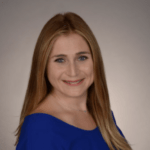
Related
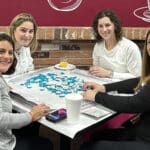 NewsDecember 10, 2024Join Others for Latkes, Vodka and Mah Jongg December 12
NewsDecember 10, 2024Join Others for Latkes, Vodka and Mah Jongg December 12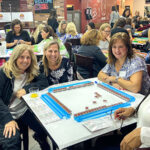 NewsNovember 25, 2023Celebrate Hanukkah with Mah Jongg, Latkes, and Vodka for a Good Cause
NewsNovember 25, 2023Celebrate Hanukkah with Mah Jongg, Latkes, and Vodka for a Good Cause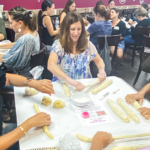 NewsNovember 13, 2023Annual Pink Challah Bake and Mah Jongg Night to Benefit Jewish Women’s Health
NewsNovember 13, 2023Annual Pink Challah Bake and Mah Jongg Night to Benefit Jewish Women’s Health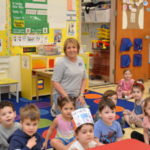 NewsJanuary 21, 2023Early Childhood Center Celebrates 20 Years in Parkland
NewsJanuary 21, 2023Early Childhood Center Celebrates 20 Years in Parkland













